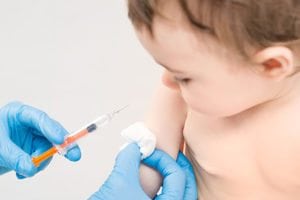Common myths about vaccines busted
Back-to-school season is almost here, which means getting the kids everything they need to take on a new year. Beyond the new backpacks, notebooks and clothes, there are also health physicals and immunizations to cross off your list. Without these, your kids won’t be able to attend this fall.
“Getting your kids vaccinated before kindergarten, high school or college ensures that everyone is protected from diseases,” said Dr. Stephanie Kelleher, DO, a primary care physician at Geisinger South Wilkes-Barre. “There’s a lot of misinformation out there but the bottom line is vaccines save lives.”
Myth: Vaccines cause autism
One argument is that vaccines cause autism spectrum disorders (ASD). However, studies show that there is no link between vaccines and ASD.
A common misconception revolves around a vaccine ingredient, thimerosal, a mercury-based preservative.
Since 2003, nine CDC-funded or conducted studies have found no link between vaccines with thimerosal and ASD.
“In the U.S today, no thimerosal is used in childhood vaccines except some formulations of flu vaccine in multi-dose vials,” said Dr. Kelleher. “The belief that vaccines cause autism is simply not true.”
No links have been found between ASD and other vaccine ingredients.
Myth: Natural immunity is better than vaccine-acquired immunity
“Natural immunity to a disease can last longer in some cases, but the risks associated with getting one of these diseases far outweighs the risks of getting a vaccine,” said Dr. Kelleher.
Natural immunity is when your body builds resistance to a disease after getting sick and recovering.
When you get a vaccine, your body creates vaccine-induced immunity, which occurs when you build resistance to a disease without the illness.
For example, to gain natural immunity from measles, you could face a one in 500 chance of death from the symptoms. This contrasts with one in 1 million people having a severe allergic reaction to the measles, mumps and rubella (MMR) vaccine.
“The price anyone can pay when fighting a disease naturally can be paralysis, brain damage, deafness, blindness or even death,” said Dr. Kelleher.
Myth: You get infected with the disease the vaccine is trying to prevent
Vaccines interact with your body’s immune system to produce a similar response that would occur if fighting a natural infection. This happens without putting your body at risk. Certain complications you may have through natural immunity will not occur when receiving a vaccine.
Myth: Hygiene, sanitation and clean water mean we don’t need vaccinations
Another myth is that good hygiene and sanitation are responsible for lower disease rates. While good hygiene, sanitation and clean water can reduce the spread of some diseases, data shows vaccines are largely responsible for the drop.
Consider the history of measles in the U.S. Widespread use of a measles vaccine shows an impactful drop in the spread of disease. Between 1968 and 1998, reported cases of measles dropped from 22,000 cases a year to fewer than 100. A similar drop in reported cases happened when vaccines for other diseases became available.
Myth: Ingredients in vaccines are harmful
Vaccines are the best defense that humans have against contagious and preventable diseases. The Food and Drug Administration (FDA) demands a licensed vaccine go through rigorous testing and multiple phases of trial before it is approved for use. Once approved, the FDA continues to monitor the vaccine’s safety.
Myth: Parents should be able to decide if their child receives a vaccine or not
State laws require children attending public schools to be up to date on vaccinations.
Talk to your doctor about which vaccinations your child may need before heading back to school. Children at different stages in life from infant up to young adult need various vaccines or boosters.
“There are very special circumstances that a person would not need to receive certain vaccinations,” said Dr. Kelleher. “Health conditions, severe allergies and age can impact whether a person should wait or not to receive vaccines.”
Speak with your doctor about your child’s medical history. Be aware of any medical conditions that may impact whether a certain vaccine is right for your child.
Myth: My kids don’t need to be vaccinated if everyone else is
Something important to understand about vaccinations, especially for kids heading back to school, is “herd immunity.” Like a herd of animals that will create a circle around its weaker members, immunized people help protect those who cannot receive vaccinations due to medical conditions.
The lower immunization rates, the weaker the herd immunity. When 90 to 95 percent of a “herd” is protected, it is nearly impossible for a germ to spread and start an epidemic.
“If too many people choose to not vaccinate themselves or their children, this can create a greater danger for everyone,” said Dr. Kelleher. “The fewer people who get vaccines and immunizations, the greater the opportunities for diseases to spread.”
Dr. Stephanie Kelleher, DO, is a primary care physician at Geisinger South Wilkes-Barre. To schedule an appointment with Dr. Kelleher or another primary care physician, please call 570-808-8780 or visit Geisinger.org.







